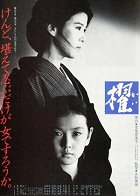Regie:
Hideo GoshaMusik:
Masaru SatōBesetzung:
Ken Ogata, Yūko Natori, Mitsuko Kusabue, Kaori Takahashi, Naomi Fujiyama, 片桐竜次, 田中隆三, Hajime Hana, Kimie Shingyôji, Masataka Naruse, Michie Terada (mehr)Kritiken (1)
A few decades (starting in 1914) in a Japanese "silent household" where she would want him to take notice of her and not just be a kneeling subservient wife of reason in the corner. And he might secretly want that too, but he's building an empire for the family (how else) that she would want him to build on other more honorable foundations. But he must not lose face outwardly, and he cannot tolerate her defiance.... Add to that the intertwining of their fates of children, staff, neighbours, all against the backdrop of the Great Famine, the rise of the countryside, the feuds of the Yakuza clans, etc. If this seems like an overly melodramatic historical soap opera fresco for a filmmaker of Gosha's stature, you'd be right. However, the traditionally exemplary character detail and insight into ordinary life in that historical period elevates it to the status of a "great novel" (it's based on a novel, after all, and you can tell). That silent domesticity is not the result of arguments or raised voices, but instead of averted glances and the unspoken. Powerful, compelling, timeless, yet it stands in the shadow of many of Gosha's other films. Mainly because there are too many plot lines and character fates surrounding the central married couple. Thus, not all of them are given the necessary space (for example, it seems to turn into a full-blown yakuza flick in the middle, only to be abandoned altogether soon after), much of it seems lost or (thanks to the leaps in narrative by decades) feels unduly abbreviated. In that respect, it should have trimmed the source material more (I assume that wouldn’t be a problem), ditching characters and entire storylines, and just going to the marrow of the central supporting marital tension.
()
Galerie (20)
Photo © Wild Side

